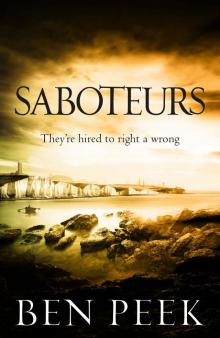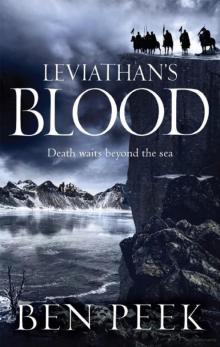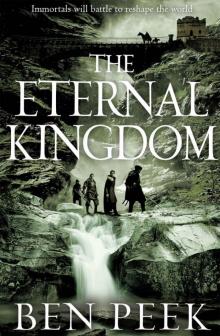The Eternal Kingdom (The Children Trilogy Book 3) Read online
Page 4
In the small cabin, Bueralan took the cup from Taela’s hands and, without a word, held her as she began to cry.
4.
‘Turn left here,’ Eidan said, lifting the lamp higher. ‘At the corner.’
Ahead, the fence of the factory yard fell in a twisted crush of wire. Through it and over it lay the end of the building’s front wall.
The debris forced Ayae to take the corner wide, but the black and brown horse followed the instruction placidly, and the rotted inside of the two-storey building soon revealed itself through a mixture of starlight and weak lamplight. It was different to the other buildings she and Eidan had passed: there was no scaffolding around it, no sense that anyone had begun to fortify the foundations that had been shifted months before. Instead, the factory looked naked and exposed, the cracked and broken walls somehow still upright, though she could clearly see the weight of the building sagging down the middle. But it was across the floor that most of the destruction had taken place: the forges had been shattered into shapeless masses before collapsing next to broken barrels, splintered handles and scattered piles of coal and wood. The damage lay beneath a ceiling of chains that had once been used to hold apparatuses, but which now fell in limp lines and broken knots.
As if to announce what had made the destruction, a shudder ran through the stone streets of Neela, and Ayae tightened her hands on the reins to keep the horse calm. The quake was different to the aftershocks that ran through the Mountains of Ger and into the camp. The latter had a pattern, an almost predictable series of tremors, whereas what ran through Neela was anything but. The tremors here were sharp and sudden, and every time she was on it, Ayae believed that it was possible the stone would break apart and send her tumbling into Leviathan’s Blood.
Yet, the tremors that ran through the city now were not as bad as they had been over a month ago. The whole city had shaken beneath its tremors then, but Eidan’s repairs had stopped that, and it now shook only in places. The worst of it was near the bridge that led into Mesi, and on into the largely residential city that was dominated by houses built tightly against one another. Eidan was confident that he could save both – ‘The pillars of both are largely intact,’ he explained – but he was not so certain about Ghaam, that city that followed Mesi. There, a generous slope to the stone roads and paths left everyone with the belief that it would soon plunge into Leviathan’s Blood.
Before Ghaam had become too dangerous to stand on, Ayae had walked to the end of it. Her path had taken her to the very edge of the city to gaze into the shifting mass of Leviathan’s Blood and the yawning expanse that existed between Ghaam and the next city, Guranatan. That side of Yeflam, Eidan said, was quite safe: the fall of Nale had primarily broken the northern side of the Floating Cities. Still, Ayae felt no comfort. She had relived her memories of the night Zaifyr died and tried to imagine what would have happened had she been able to reach him. No matter how she allowed the story to unfold, she could never convince herself of a different outcome. She would only have died beside him.
‘Here,’ Eidan said. ‘Here will do nicely.’
She pulled up the cart’s brake. ‘How do you know that one of the pillars is here?’
‘I feel every part of Yeflam, even those that have sunk.’ Slowly, he climbed down. ‘It is said Sil could feel the same in her creations, in the continents, just as I do Yeflam. She could hear them as I hear the pillars beneath me, telling me their weakness.’ With the lamp held in his good hand, the stout man limped along the street, his soft, loose clothes looking like an assortment of rags. ‘At least, that is what is said,’ he said with a hint of self-mockery, ‘and you know you can always trust what is said.’
Sil had been the God of the Earth. ‘How can you be so sure your power is hers?’ she asked, following him.
‘You can find her remains in the tunnels that lead to the Saan. You will probably never know this, but it is a unique experience to stand before the remains of a god still with your power. Hate is not strong enough a word for what they feel towards you.’
‘Zaifyr told me that if you stand before any god, you feel that.’
‘It is not the same. I have often thought that the gods hate all living things. It is not a theory everyone shares, however.’
‘Jae’le?’ she asked.
‘There are better things to ask Jae’le about,’ Eidan said. ‘Ask him if he has found Zaifyr yet, for example.’
‘I don’t want to ask.’
‘I have noticed.’ He paused and turned to her. ‘Why is that?’
‘It’s morbid, Eidan.’
‘Only now,’ he said. ‘Death used to be sacred. To think about it, to ponder it, was considered an intellectual field for philosophers. I remember reading in my youth a book that argued that it was only through death that the gods bestowed their pleasure and displeasure. I think of what that author wrote, lately. In the days when the gods stood among us, a funeral was an event for a town as much as it was for a family. Everyone came out to see what judgement was passed on the deceased. Decay was seen as punishment, youth as a reward. To be returned to a child was something else, however, for quite often the gods would return such a person to life, to live again, and in doing so, exile them from paradise.’
‘Did you ever see that happen?’
‘No. Only Jae’le and Zaifyr saw such things.’
In the broken remains of the factory, she heard a sound: a stone falling, as if it had dropped through a hole in a floor. ‘Are we being watched?’
‘By two men.’ With his good foot, Eidan began to clear a space on the road, pushing dirt and stone away. ‘But my original point was that we have honoured the dead differently throughout time. Jae’le and I are simply men from a different time.’
‘You should learn to cry,’ she said. ‘Aren’t tears enough?’
‘For our brother?’ He gave a small smile and shook his head. ‘It would depend entirely on whose tears they were, I believe.’
‘Then be angry.’
Indistinct sounds – words, she was sure – came from the building. ‘My brother is angry,’ he said. He lowered the lamp to the ground, but did not turn towards the sound. ‘I cannot make out what they are saying. The building is too damaged for that, but I do not believe that they are friends of ours. They are on the second floor, arguing.’
He would have trouble climbing the broken stairs. ‘I’ll check it out,’ Ayae said. ‘But, Eidan, if only Jae’le is angry, what does that leave you?’
‘Sad, mostly.’ He sank into a sitting position, both his good hand and crippled hand flat on the ground. ‘I had not thought to see our violence return.’
He meant Asila, of course.
Ayae stepped over a section of rubble and began to make her way to the factory. She was in clear sight of the two inside, but she did not hear anything, or see anyone, even as the light from Eidan’s lamp began to fade. She did not think of the men in the building as she approached it. Instead, she thought of Asila. It was not surprising: for Eidan, Jae’le and Aelyn, for all of Zaifyr’s family, Asila was always the point of return. They were obsessed with it, and their obsession had begun to lay itself in her. She had finally begun to understand that Zaifyr’s family did not return to it because of the madness he had suffered, nor because of the horrors he had unleashed: no, they returned to it because of the battle with him, because of what it had revealed of themselves, and because of the small, crooked tower in the Eakar mountains in which they had been forced to imprison him for a thousand years.
In the aftermath of that, their family had broken, and the world they understood had fallen away.
In the months since Zaifyr had been killed by Aelyn, Ayae had come to see Yeflam as the perfect metaphor for how the immortals viewed themselves in the world. Unable to form a unified whole, they had become two distinct entities, divided by what they had learned about themselves at Asila, and divided again by the violence that they had done to each other in Yeflam. It would take decades t
o repair what had been done to the physical nation of Yeflam, if it could be repaired. Eidan had been quite clear that he might not be able to save the cities that had sunk into the ocean. When he spoke, Ayae knew, he was not just speaking about his creation.
At the entrance to the factory, she paused. It was dark, but she could still see the damage inside. It was in worse shape than she had at first thought.
The walls sagged and the floor above her tilted down, as if it was ready to break apart and fall on her. Chunks of plaster and wood from both had crashed to the ground, mixing with the debris that the forges and tools had made, leaving the impression that the building had begun to weep in on itself. Yet, even with the sense that the factory walls could collapse around her at any moment, Ayae took a step forwards, her boots finding purchase between broken bricks. Her hand curled around the hilt of her sword and, above her, the chains attached to the ceiling began to catch alight with small flames, one after the other finding purchase on the metal. Ayae did it without effort, with an ease that she had become more and more comfortable with since the night Yeflam broke apart. Beneath the light, she continued forwards, until she paused in the middle of the room as a harsh voice caught her attention—
The floor above her shook.
And shook again as the two men had begun to jump on it, trying to bring the floor down upon her.
Darting forwards, Ayae made her way swiftly through the debris, the ceiling shaking after her as she closed in on the shadowed steel staircase.
The speed by which she came up the stairs and into the room surprised the two men. While both were startled to see her, neither hesitated to rush her, despite the fact that they were unarmed. As they drew closer, Ayae saw that the men wore old clothes, clothes that had been lived in for the last four months and showed the wear of that time, as did their faces. The first to reach her – a white, middle-aged man with shaggy, greying hair – threw a wild punch that she was able to step around easily, while the second – a black man of similar age, but with a head of short black hair – threw himself at her.
He hit the ground hard, causing the building to shudder, and both Ayae and the white man nearly lost their footing.
Ayae knew that the real threat was not the two men before her, but from the weakness of the floor. She could feel it sag beneath her feet as she took a step forwards to sway beneath the white man’s punch. Her right hand thrust out, palm flat into his stomach, but rather than hitting him with all her strength and launching him through the air, she held back, and he doubled over instead. Her left hand, following through, landed on the back of the man’s head and he fell to the ground unconscious. With a quick step, she lashed out with her right boot, and kicked the black man in the side of the head as he tried to rise.
‘Well done,’ a voice said behind her.
5.
Eventually, Taela asked if Bueralan could leave her alone, just for a while.
He pulled the door shut gently and made his way along the corridor, the low ceiling forcing him to hunch as he did. He glanced behind him, once, just once, as he stood at the base of the stairs that led onto the deck of Glafanr, but the saboteur knew that he could do very little for Taela: her pain could not be shared. Se’Saera’s violation of her had been terrible and intimate in nature, a rape by all definitions, and Bueralan knew he could do nothing to change this fact.
On the deck, the moonlit water lay in a smooth, black expanse, mirroring the wooden boards that he walked across.
Glafanr was a huge and ancient creature on Leviathan’s Blood. Despite its size, it glided through the waves as if it were a sleeker, smaller ship, and there was no doubting the terror it would strike into anyone who saw it coming for them. Standing beneath its five masts, Bueralan felt dwarfed. From the thick masts, sails made from a deep crimson unfurled, flecks of black littered through them. At the very top of the centre masts were two crow’s nests. It was from one of those that he had heard the sad melody of a flute earlier. No such music greeted him in the darkness as he passed beneath it now. Below the deck, behind narrow doors and in rooms that ran three levels deep before the hold opened up, Aela Ren and his army lay in their narrow beds, leaving the piloting of the ship to other hands.
‘You don’t sleep, Bueralan.’ Se’Saera stood at Glafanr’s bow. She wore a simple gown of white that, along with her white skin and blonde hair, caught the moon’s light and left her with an ethereal quality. ‘Yet again.’
‘The night is the best time to be awake,’ he said. ‘Wouldn’t you agree?’
‘I merely guide the ship at night,’ she said. ‘It is my gift to the men and women who sleep beneath us – who sleep as they have never slept before.’
The night that Bueralan had ridden out of Cynama, the night he had begun to ride towards Dynamos and the hulking shape of Glafanr, Samuel Orlan had told him that Ren and his soldiers had not slept since the War of the Gods. On the day Linae fell, the cartographer said, sleep had been taken from them. As the old man spoke, the sky above them had been tinged red, turned that colour by the fires that burned in the city, by the lava that had awakened before they left. In that light, the men and women around him of Ren’s army looked gaunt and malnourished.
‘Imagine the gift she gives them,’ Orlan had said. ‘The weight she lifts from them with a simple gesture.’
To the new god, Bueralan said now, ‘You buy them cheaply.’
‘I have not bought them at all.’ Se’Saera’s gaze left the black ocean and met his. ‘They are the mortal instruments of gods. They were once figures of glory. They will be once again.’
‘I don’t wish for glory.’
‘I know. I have treated you poorly, Bueralan. I do not apologize for it, but I do acknowledge it.’ She turned away. ‘I can see now that I rushed to consume everything around me. To consume the world of my parents. My Faithful were at times affected by this. But with a name, I have grown . . . more aware of the world. One day, you will understand this.’
This change in the god’s personality still unsettled Bueralan. At first, he had greeted it with relief, but it was not until he rode out of Cynama that he realized how deeply it bothered him. When she first appeared – after he had said her name – she accused him of conspiring against her with others. She had been much like the child he had met in the cathedral in Ranan. There, he would have said that she hated him, that she held the death of her Mother Estalia against him, and saw conspiracies and enemies everywhere. But that had not been the case since he had said her name.
‘We will find the wreckage of a ship tonight,’ the god said to him. ‘I saw it in a dream. An hour before dawn, the wreckage will appear to you and I. You and Aela will swim over to it. You will search for the First Queen.’
‘The First Queen is dead. She did not survive your attack on Cynama.’
‘You said that in my dream. You wore that sword Aela allowed you to reclaim and you held it tightly, as if you would use it.’
The sword still lay beneath his narrow bed. ‘What did you say next?’ he asked.
‘I said that I agreed,’ she said. ‘But I do not. The First Queen still lives. You will find evidence of her escape on the wreckage we find.’
Bueralan’s only relief from her change came from this, came from the fact that she did not consider herself a complete god.
He had discovered it by accident, having overheard the new god and Aela Ren in the remains of the First Queen’s palace after he had entered the ruins. As the midday’s sun rose high, Bueralan had walked down a set of broken stairs and into a massive web of passages and cellars. He told Orlan that he was going to look for Taela, but mostly he wanted to be away from the smoke and the smell of sulphur. After a short, painful walk, the dark passage around him shifted and earth rained over him as the foundations of the palace’s remains threatened collapse, he considered turning back to the daylight.
It was then that he heard Se’Saera’s voice.
‘The paintings are of Mahga, of the Fifth Kingdom,�
�� she was saying. ‘They were commissioned to show its splendour. Its decadence.’
‘Rivers that run with gold,’ the Innocent replied. ‘It is surely what the Five Queens sought to remake in their reign.’
‘No.’ It was Taela who spoke, her voice cracking, as if it struggled against itself and its use. ‘No,’ she repeated. ‘Zeala Fe did not want to remake Mahga. She showed me these paintings. She spoke about how it was a mistake to try and recapture it. How we had to break away from it.’
‘In this matter, she was correct.’ Bueralan could not tell if Se’Saera’s voice leaked through the cracks in the wall or if it drifted up the passage he stood in. But he remained still, afraid to move and lose the sound. ‘Mahga was Eidan’s kingdom. Few could rule as he did.’
‘Eidan believed he was a god. His brothers and sisters shared that belief.’ It was Ren who spoke then, his voice calm. ‘They left their kingdoms once they realized they were not.’
‘I have seen parts of it,’ Se’Saera said. ‘The past is strange to me. It feels to me as the present does now. Last night I dreamed that Eidan returned here even as he did not.’
‘The gods saw all of time at once. It was not linear to them. It will not be linear to you, once you have gathered all the power of the gods to you.’
‘I once considered him an ally, Aela. He turned on me and spoke against me in Yeflam.’
‘What did he say?’
‘He passed judgement on me. My parents had left a messenger to tell the world that I was not their child. He agreed with it.’
‘Was the messenger one of us?’ the Innocent asked.
‘No, he was a cursed mortal. His name was Lor Jix.’ Se’Saera said the name without emotion and it was there, at this moment, that Bueralan began to realize just how much she had changed. ‘He had been a priest of my mother, the Leviathan.’
‘Yet you are a god,’ he said. ‘It is not just your name or your presence. I see you gather the remains of the gods to you. You are them, even if they did not wish you to be. I was never told the reason why the gods went to war. My master, your father, did not share that with me. The same is true of all of us. But we were their mortal instruments. We can see the divine in the world. We saw it in the pretenders. We saw it in the unfortunates who could not control it. We have seen what has happened when the divine has been broken apart as it has. I cannot imagine that any priest, cursed or otherwise, could look upon the world and believe that it is better for what the gods have done.’

 Saboteurs
Saboteurs The Godless
The Godless Leviathan's Blood
Leviathan's Blood Dead Americans
Dead Americans The Eternal Kingdom (The Children Trilogy Book 3)
The Eternal Kingdom (The Children Trilogy Book 3)